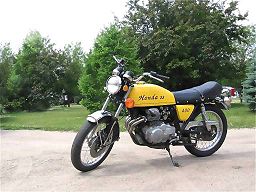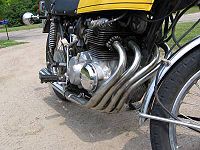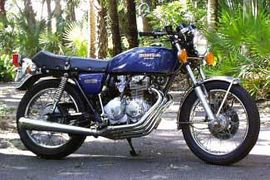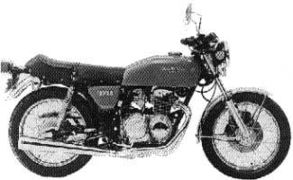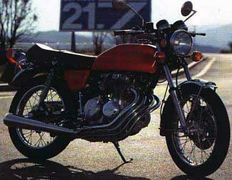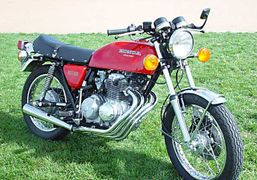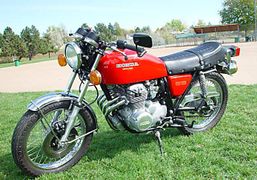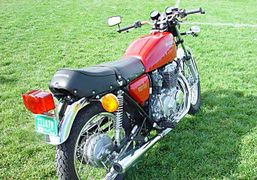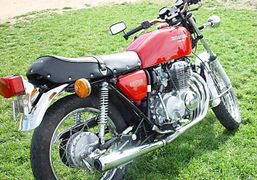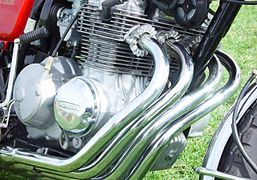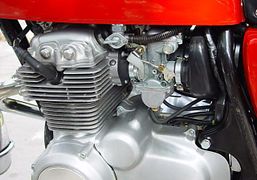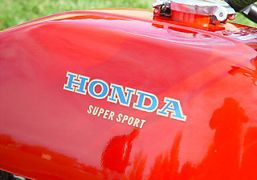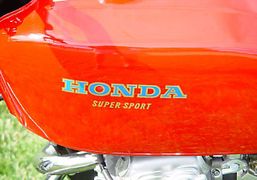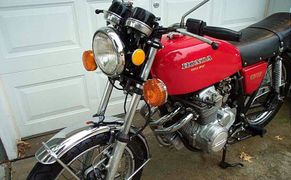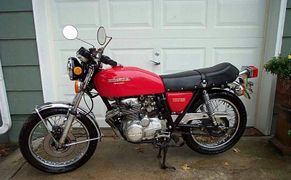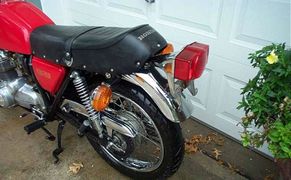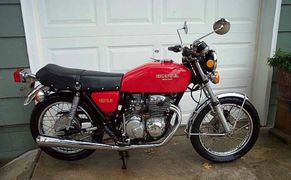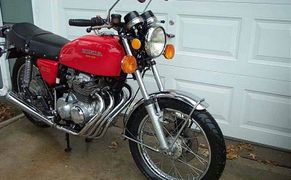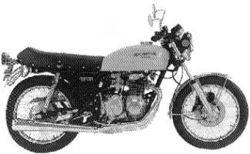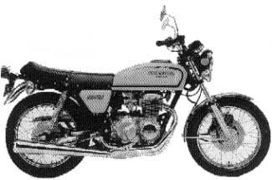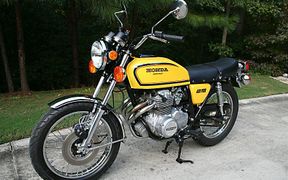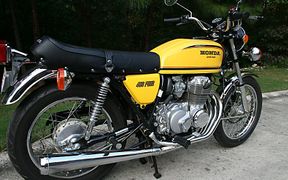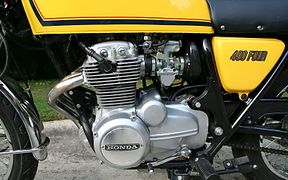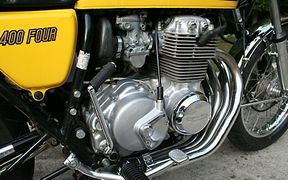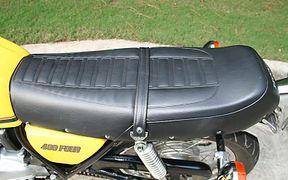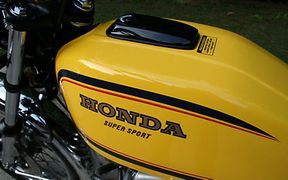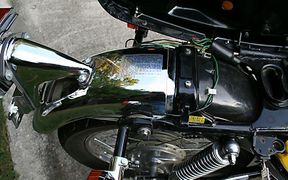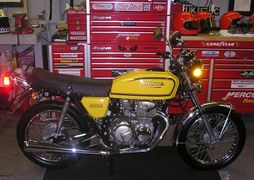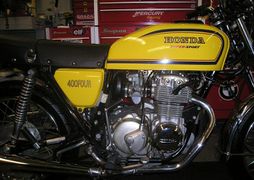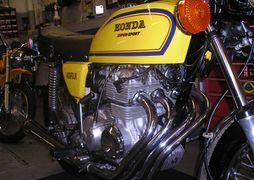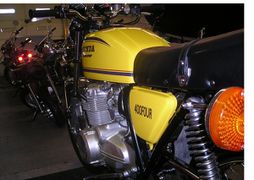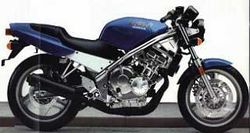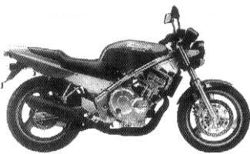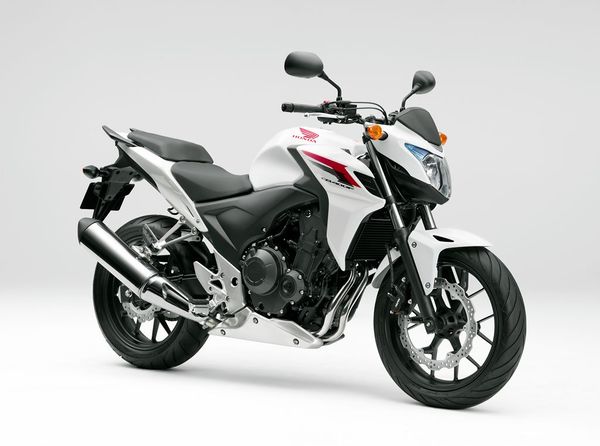Honda CB400F
After introducing the four-cylinder string of lighter fours featuring engines as small as 350 cc (CB350 Four, CB500 Four), and this 408 cc Four.
For the most part, the CB400F was simply an upgraded version of the 350 model from the previous year. The most striking change was the swoopy four-into-one exhaust system that snaked around the frame, converging into a single muffler on the right side of the bike. Also noticeable were the angular fuel tank and flat cafe-style handlebars, all of which gave the bike a more racer-like look and feel than the rather pedestrian 350.
Although aimed at the sporting segment of the market, the CB400F came up a little short in the performance department compared to the competition, most notably the quick but noisy two-stroke triples from Kawasaki. But whatever the CB400F engine lacked in power it made up for in refinement, the small-displacement four-stroke being smooth and less audibly irritating than a two-stroke. To help keep the engine in its power band, Honda employed a six-speed transmission—something of a rarity at the time.
It should also be noted that the CB400F was a very successful Motorcycle in club or privateer racing. Kaz Yoshima and other racers were able to take Honda's little 408cc engine up to 490cc and with the addition of other racer options, this small bore was considered a 'giant killer'.
First Generation[edit | edit source]
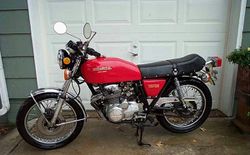 |
|
| Honda CB400F (1st Generation) | |
| Manufacturer | |
|---|---|
| Production | 1974 - 1977 |
| Class | Standard |
| Engine | 408cc transverse four, four-stroke |
| Compression ratio | 10.7:1 |
| Top Speed | 93.5 mph |
| Horsepower | 46.94 HP (35.0 KW) @ 8500RPM |
| Fuel System | EFI |
| Spark Plug | NGK D8EA |
| Battery | YUASA 12N12A-4A-1 |
| Final Drive | Chain: 525x104 |
| Front Sprocket | 15T |
| Rear Sprocket | 41T |
| Suspension | Front: 41mm telescopic fork Rear: Pro-Link adjustable monoshock |
| Brakes | Front: single 320mm discs, 2-piston calipers Rear: single 240mm disc, 1-piston caliper |
| Front Tire | 3.00x18 |
| Rear Tire | 3.50x18 |
| Wheelbase | 55.12 inches (1400 mm) |
| Weight | 375 pounds (170 kg) (dry), 390 pounds (178 kg) (wet) |
| Oil Capacity | 3.5 L (3.7 US qt) [1] |
| Oil Filter | K&N KN-401 |
| Recommended Oil | Honda GN4 10W-40 |
| Fuel Capacity | 3.7 gallons, including 0.88 gallon reserve |
| Related | Honda CB350F |
| Manuals | File:Honda CB400F 1972 Workshop Manual.pdf More Manuals |
1975[edit | edit source]
The Honda Super Sport 400 designated CB400F0 was sold in 1975. Two colors were available: Light Ruby Red and Varnish Blue. The fuel tank and side covers were painted one of the basic colors. The exhaust system was a 4-into-1. The handlebars were low. The engine was a 408cc 4-stroke SOHC inline four cylinder with four carburetors. The transmission was a 6-speed. The serial number began CB400F-1000001.
1976[edit | edit source]
The CB400F'76 was sold in 1976 and was available in two colors: Light Ruby Red or Parakeet Yellow. The gas tank was the basic color (red or yellow), but the side covers were black. The exhaust system was a 4-into-1. The handlebars were low. The engine was a 408cc 4-stroke SOHC inline four cylinder with four carburetors. The transmission was a 6-speed. The serial number began CB400F-2000001.
1977[edit | edit source]
The CB400F'77 was sold in 1977 and was available in two colors: Candy Antares Red or Parakeet Yellow. The gas tank stripes were gold and orange on the red bike, but black and red on the yellow bike. The gas tank filler cap was recessed. The handlebars were raised. The exhaust system was a 4-into-1. The engine was a 408cc 4-stroke SOHC inline four cylinder with four carburetors. The transmission was a 6-speed. The serial number began CB400F-2100001.
Second Generation[edit | edit source]
 |
|
| Honda CB400F | |
| Manufacturer | |
|---|---|
| Production | 1974 - 1977, 1989 - 1990, |
| Class | Standard |
| Engine | 399cc transverse four, four-stroke |
| Bore / Stroke | 55.0 x 42.0 mm [2] |
| Compression ratio | 10.7:1 |
| Top Speed | 93.5 mph |
| Horsepower | 46.94 HP (35.0 KW) @ 8500RPM |
| Fuel System | VG06 Carburetor |
| Spark Plug | NGK CR8EH-9 [2] |
| Final Drive | Chain: 525x104 |
| Front Sprocket | 15T |
| Rear Sprocket | 41T |
| Suspension | Front: 41mm telescopic fork Rear: Pro-Link adjustable monoshock |
| Brakes | Front: single 320mm discs, 2-piston calipers Rear: single 240mm disc, 1-piston caliper |
| Front Tire | 110/70-17 [2] |
| Rear Tire | 140/70-17 [2] |
| Wheelbase | 1370mm (53.9 in) [2] |
| Length | 2035 mm (80.1 in) |
| Width | 705 mm (27.8 in) |
| Height | 1025 mm (40.4 in) |
| Weight | 375 pounds (170 kg) (dry), 390 pounds (178 kg) (wet) |
| Oil Capacity | 3.1 L (3.28 US qt) [2] |
| Oil Filter | K&N KN-401 |
| Recommended Oil | Honda GN4 10W-40 |
| Fuel Capacity | 11.5 L ( 3.04 US gal) [2] |
| Manuals | File:Honda CB400F CB-1 1989 Service Manual English.pdf More Manuals |
1989[edit | edit source]
The CB400F'89 CB-1 was sold in 1989 in just one color: Pearl Presto Blue. The exhaust system was a 4-into-1. The camshafts were gear driven. The engine was a 399cc DOHC 4-valve liquid cooled inline 4 cylinder linked to a 6-speed transmission. The serial number began JH2NC270*KM000010.
1990[edit | edit source]
CB400F'90 CB-1 was sold in 1990 in just one color: Pearl Presto Blue. The "CB-1" tank logo was red. The exhaust system was a 4-into-1. The camshafts were gear driven. The engine was a 399cc DOHC 4-valve liquid cooled inline 4 cylinder linked to a 6-speed transmission. The serial number began JH2NC270*LM100010.
Third Generation[edit | edit source]
 |
|
| Honda CB400F | |
| Manufacturer | |
|---|---|
| Production | 1974 - 1977, 1989 - 1990, |
| Class | Standard |
| Engine | 408cc transverse four, four-stroke |
| Compression ratio | 10.7:1 |
| Top Speed | 93.5 mph |
| Horsepower | 46.94 HP (35.0 KW) @ 8500RPM |
| Fuel System | EFI |
| Spark Plug | NGK D8EA |
| Battery | YUASA 12N12A-4A-1 |
| Final Drive | Chain: 525x104 |
| Front Sprocket | 15T |
| Rear Sprocket | 41T |
| Suspension | Front: 41mm telescopic fork Rear: Pro-Link adjustable monoshock |
| Brakes | Front: single 320mm discs, 2-piston calipers Rear: single 240mm disc, 1-piston caliper |
| Front Tire | 3.00x18 |
| Rear Tire | 3.50x18 |
| Wheelbase | 55.12 inches (1400 mm) |
| Weight | 375 pounds (170 kg) (dry), 390 pounds (178 kg) (wet) |
| Oil Filter | K&N KN-401 |
| Recommended Oil | Honda GN4 10W-40 |
| Fuel Capacity | 3.7 gallons, including 0.88 gallon reserve |
| Manuals | Service Manual |
2013 Honda CB 400F[edit | edit source]
The 2013 MY Honda CB 400F has, at its heart, a liquid-stroke, four-stroke, 399cc, parallel twin cylinder powerplant that was paired to a six-speed manual transmission with a chain final drive, and can reach a maximum power output of 47 horsepower at 8500 rpm.
Standard features for this machine include a small, nose-fairing with a matte windscreen, small side-fairings, a two-piece, two-up seat with passenger grab handles, die-cast, black aluminum wheels, a telescopic front fork, a Pro-Link monoshock as a rear suspension, analogue and digital instrumentation panels and a chromed exhaust system.
2014 Honda CB 400F[edit | edit source]
The 2014 MY Honda CB 400F has been equipped with a small, nose-fairing with a matte windscreen, small side-fairings, a two-piece, two-up seat with passenger grab handles, die-cast, black aluminum wheels, a telescopic front fork, a Pro-Link monoshock as a rear suspension, analogue and digital instrumentation panels and a chromed exhaust system.
In the engine department it is powered by a four-stroke, liquid-cooled, 399cc, parallel twin cylinder powerhouse, mated to a six-speed manual transmission with a chain final drive, that can produce a claimed 47 horsepower at 8500 rpm.
2015 Honda CB 400F[edit | edit source]
The 2015 MY Honda CB 400F can reach a maximum power output of 47 horsepower at 8500 rpm from its liquid-cooled, four-stroke, 399cc, parallel twin cylinder powerhouse that was mated to a five-speed manual transmission with a chain final drive.
In addition, it has standard fittings such as a small, nose-fairing with a matte windscreen, small side-fairings, a two-piece, two-up seat with passenger grab handles, die-cast, black aluminum wheels, a telescopic front fork, a Pro-Link monoshock as a rear suspension, analogue and digital instrumentation panels and a chromed exhaust system.
See Also[edit | edit source]
References[edit | edit source]
| ||||||||||||||
